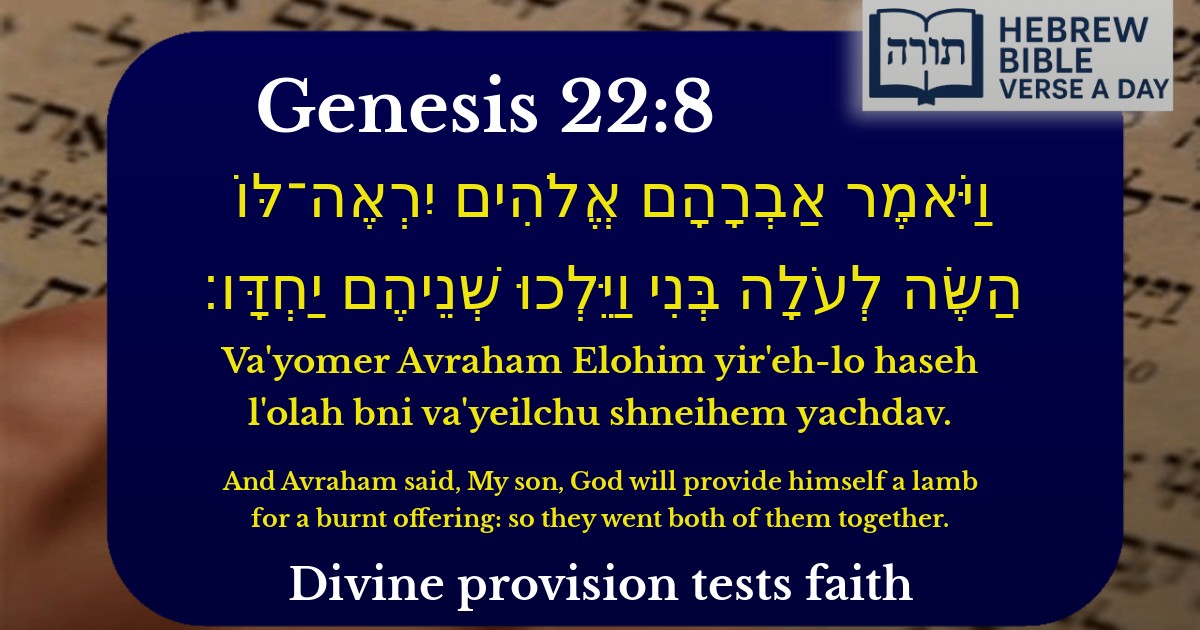Join Our Newsletter To Be Informed When New Videos Are Posted
Join the thousands of fellow Studends who rely on our videos to learn how to read the bible in Hebrew for free!
Hebrew Text
וַיֹּאמֶר אַבְרָהָם אֱלֹהִים יִרְאֶה־לּוֹ הַשֶּׂה לְעֹלָה בְּנִי וַיֵּלְכוּ שְׁנֵיהֶם יַחְדָּו׃
English Translation
And Avraham said, My son, God will provide himself a lamb for a burnt offering: so they went both of them together.
Transliteration
Va'yomer Avraham Elohim yir'eh-lo haseh l'olah bni va'yeilchu shneihem yachdav.
Hebrew Leining Text
וַיֹּ֙אמֶר֙ אַבְרָהָ֔ם אֱלֹהִ֞ים יִרְאֶה־לּ֥וֹ הַשֶּׂ֛ה לְעֹלָ֖ה בְּנִ֑י וַיֵּלְכ֥וּ שְׁנֵיהֶ֖ם יַחְדָּֽו׃
וַיֹּ֙אמֶר֙ אַבְרָהָ֔ם אֱלֹהִ֞ים יִרְאֶה־לּ֥וֹ הַשֶּׂ֛ה לְעֹלָ֖ה בְּנִ֑י וַיֵּלְכ֥וּ שְׁנֵיהֶ֖ם יַחְדָּֽו׃
🎵 Listen to leining
Parasha Commentary
📚 Talmud Citations
This verse is quoted in the Talmud.
📖 Sanhedrin 89b
The verse is discussed in the context of the binding of Isaac (Akeidat Yitzchak), where it is cited to illustrate Abraham's faith and the divine intervention in providing a ram for the sacrifice.
📖 Berakhot 62b
The verse is referenced in a discussion about the merits of walking together in unity and the significance of Abraham and Isaac's joint journey.


Avraham's Faith and Divine Providence
The verse (Bereshit 22:8) records Avraham's response to Yitzchak's question about the lamb for the offering. Avraham declares, "Elohim yireh-lo haseh le'olah bni" ("God will provide Himself a lamb for a burnt offering, my son"). Rashi explains that Avraham spoke prophetically, hinting at the future Temple in Yerushalayim, where offerings would be brought. The term "yireh" (will provide/see) alludes to the name "Har HaMoriah" (the mountain where God is seen), the future site of the Beit HaMikdash.
The Deeper Meaning of "Yachdav" (Together)
The phrase "vayeilchu shneihem yachdav" ("so they went both of them together") appears twice in the Akeidah narrative (Bereshit 22:6 and 22:8). The Midrash (Bereshit Rabbah 56:4) highlights that their unity in fulfilling God's will was complete—Avraham with the knife, and Yitzchak willingly bound. The Rambam (Hilchot Yesodei HaTorah 5:3) cites this as the ultimate example of mesirut nefesh (self-sacrifice) for kiddush Hashem.
The Lamb as a Symbol
Theological Implications
The Talmud (Ta'anit 16a) connects this verse to the concept of "zechut Avot" (merit of the Patriarchs), noting that the Akeidah became an eternal merit for Bnei Yisrael. The Zohar (1:119b) teaches that Avraham's declaration revealed the divine attribute of mercy (Midat HaRachamim), which would temper justice in future generations.